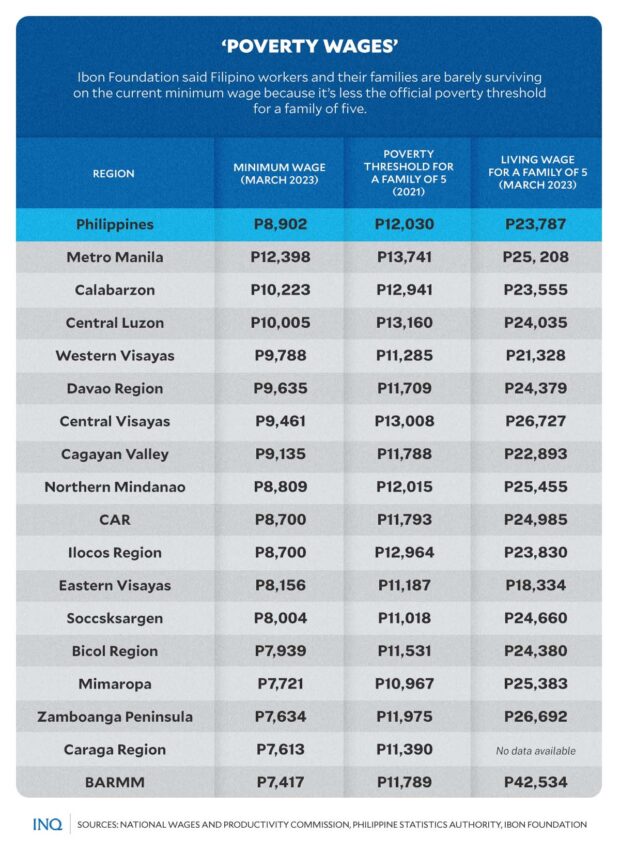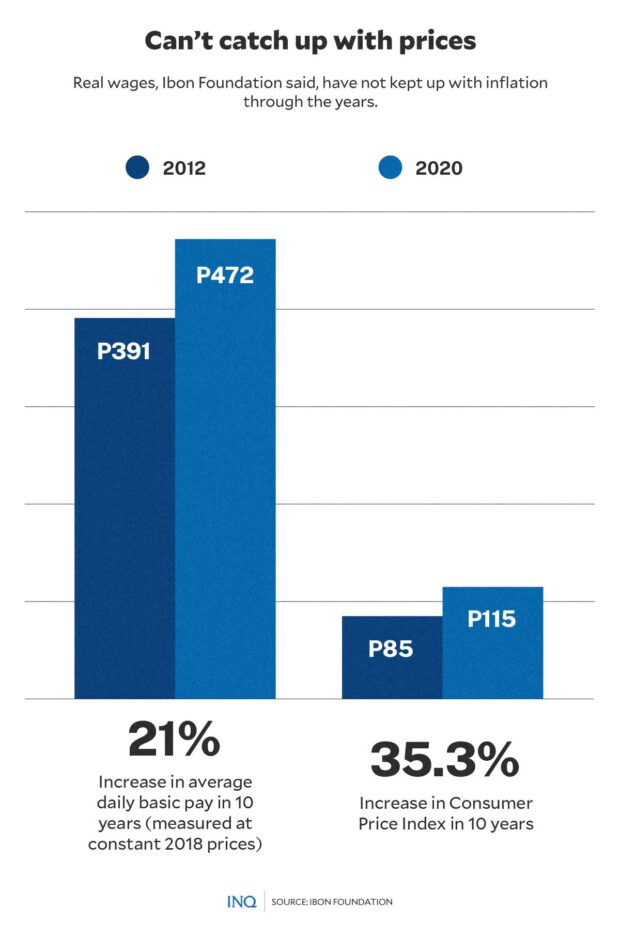Basic wage in PH not even enough to meet poverty threshold, says think tank

COMPOSITE IMAGE: JEROME CRISTOBAL FROM PDI, REUTERS, INQ FILE PHOTOS
MANILA, Philippines—The poverty threshold, which the government sets, already “grossly underestimates” poverty in the Philippines, but what’s worse, a think tank stressed is that the minimum wage Filipino workers receive is not even above the poverty line.
According to Ibon Foundation, Filipino workers and their families “are barely surviving on the minimum wage [set by the government] because this is even less than the official poverty threshold for a family of five.”
According to data from the Philippine Statistics Authority (PSA), the poverty threshold in 2021, the minimum income a family of five needs to meet basic food and non-food requirements, was P12,030, or almost P80 a day for every family member.
Ibon Foundation already stressed in 2019 that the poverty line is too low–the reason that millions of poor Filipinos are left out of the data the government releases every three years.
But this is not the only problem since, based on data from the National Wages and Productivity Commission, the average monthly minimum wage in the Philippines is only P8,902, which is P3,128 or 26 percent less than the already low poverty threshold.
Article continues after this advertisementAs stressed by the think tank, “[this] makes the minimum wage a family poverty wage.”
Article continues after this advertisement
GRAPHIC Ed Lustan
This as when compared to the living wage that a family of five needs to live decently, which is P23,787 as of March 2023. The average minimum wage is P14,885 or 63 percent less.
Ibon Foundation explained that the average minimum wage is computed by getting the average of the 17 regional wages, which in turn is estimated by converting the regional minimum wages into their Estimated Equivalent Monthly Rate.
‘Hard for us’
A single mother working at a Business Process Outsourcing company in Metro Manila, Roselyn Cayosa, 24, told INQUIRER.net that her minimum wage is “hardly enough” for her and her two children. “How much more for a family of five?” she said.
RELATED STORY: Giving up some needs: How the poor deal with high inflation
Ibon Foundation said in Metro Manila, the average minimum wage is P12,398 a month. While it is already the highest in the Philippines, it is P1,343 or 10 percent less than the P13,741 poverty threshold for a family of five in the region.
However, there is a much bigger gap of P12,811 or 51 percent when the minimum wage in Metro Manila is compared to the family living wage in the region, which is P25,208 as of March 2023.
But as the think tank stressed, the situation is “worse” in the rest of the Philippines.

GRAPHIC Ed Lustan
Take the case of the Bangsamoro Autonomous Region in Muslim Mindanao, where the minimum wage is only P7,417 a month. It is P4,372 or 36 percent less than the P11,789 poverty line and P35,117 or 71 percent less than the P42,534 family living wage.
The situation is the same in Calabarzon, where the P10,223 minimum wage is P2,718 or 13 percent less than the P12,941 poverty threshold and P13,332 or 54 percent less than the family living wage in the region.
Past wage hikes ‘not enough’
As stressed by Ibon Foundation, the wage situation started to get even worse in the previous administration, saying that even before the COVID-19 lockdowns, the government led by then President Rodrigo Duterte had one of the fewest wage hikes.
It also had one of the lowest wage increases among the six administrations since 1986.
The think tank said in Metro Manila, for instance, only three wage hikes and a 16.1 percent increase in the minimum wage from 2016 to 2022.
“These wage hikes were less in number and smaller in magnitude compared to previous administrations,” said Ibon.
- Corazon Aquino (1986 to 1992): 6 hikes, 218.9 percent increase
- Fidel Ramos (1992 to 2008): 7 hikes, 67.8 percent increase
- Joseph Estrada (1998 to 2001): 2 hikes, 26.3 percent increase
- Gloria Macapagal-Arroyo (2001 to 2010): 7 hikes, 67.8 percent increase
- Benigno Aquino III (2010 to 2016): 6 hikes, 28.5 percent increase
“Meanwhile, the current Marcos Jr. administration has yet to mandate any wage increase despite heightening public clamor as well as petitions and bills filed by labor groups and lawmakers, respectively,” it said.
As Ibon Foundation stressed, “the nominal wage has failed to cope with the constant increase in prices, thus causing the historic decline of the real value of the minimum wage.”
According to data from the think tank, average daily basic pay (ADBP) grew only by less than 21 percent from P391 in 2012 to P472 in 2022 even if the consumer price index (CPI) increased by 35.3 percent from 85 in 2012 to 115 in 2022.
The CPI, as defined by the PSA, is “an indicator of the change in the average retail prices of a fixed basket of goods and services commonly purchased by households relative to a base year.”
Ibon Foundation said accelerating inflation since last year “makes wage hikes all the more urgent,” stressing that nominal wages “were never enough to provide a decent standard of living but are now even falling in real terms.”
Headline inflation slowed down for the third month in a row to 6.6 percent last April, coming in below analysts’ consensus forecast of 7 percent and the Bangko Sentral ng Pilipinas’ 6.7 percent.
READ: Philippine inflation eased further to 6.6% in April
But while Finance Secretary Benjamin Diokno said the recent inflation numbers “indicate that we are on track to managing inflation,” year-to-date, the readout stands at 7.9 percent, higher than the target range of 2 percent to 4 percent.
READ: Inflation rate on a ‘downward trajectory,’ says Neda chief
Worker’s gains not translating to higher wages
Ibon Foundation said it observed that even though “labor productivity has been increasing […] workers’ real wages are falling,” stressing that the gains from growing productivity only translate to profits of corporations and the wealth of the super-rich.
Worker productivity has been a driving force of economic growth in the past decade, stating that, measured at constant 2018 prices, labor productivity increased by 28.9 percent from P330,035 for every worker in 2012 to P425,511 in 2022.
RELATED STORY: Bill pushing for P150 increase in private workers’ daily wages filed in House
Also measured in real terms, the economy grew by 6.2%, with gross domestic product (GDP) increasing from P12.4 trillion in 2012 to P19.9 trillion in 2022, it said.
As the think tank stressed, wages lagging behind labor productivity implied that “the benefits from economic activity are disproportionately going to corporate profits [and wealth of the super-rich].”
It said, for instance, the profits of enterprises of all sizes increased by over 72 percent from P2 trillion in 2012 to P3.4 trillion in 2019 before the lockdowns. For the Top 1,000 corporations in the Philippines, profits increased by nearly 35 percent between 2012 and 2019 and then by 25 percent between 2019 and 2021.
RELATED STORY: Wage hike calls ring louder as falsity of reason to reject it emerges
“As it is, the nominal ADBP across all industries still falls far short of the family living wage,” it said, stressing that “giving workers their fair share through decent wages will uplift their lives and also spur economic progress.”
Ibon Foundation said, “instead of concealing how millions of Filipino workers and their families are struggling to live on family poverty wages, the government can and should immediately give a substantial and meaningful wage increase.”